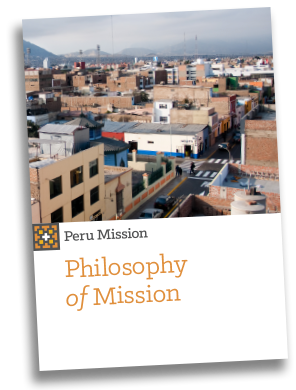
Our Mission Philosophy
Peru Mission Philosophy of Mission
The Great Commission (Matt 28.18-20) is properly understood in the context of the Cultural Mandate (Gen 1.26-28). In the beginning Adam is charged to build the City of God, but his descendants end up building Babel (Gen 11). Revelation 21-22, however, shows us Jesus, the new Adam, who fulfills the original mandate and turns the fallen and spoiled garden into a beautiful city. This is the overarching story from within which we must understand the Great Commission.

Peru Mission takes up the call to participate in God’s mission with five core convictions about both his plan for the world and his strategy for making that plan a reality.
Read our Complete
Philosophy of Mission
Our final reward as Christians is not heaven. That is our penultimate reward between the time of our death and the general resurrection. Our ultimate hope is in the resurrection of our bodies and the renewal of all of Creation.
This renewal actually began 2000 years ago when Jesus got up out of the grave in His renewed, glorified body. Now in a grand and mysterious way, our ministry of preaching, serving the poor, and healing the sick is part of Jesus’ project of restoring creation and building the City of God. The Church, in the power of the Holy Spirit, is God’s special instrument of transformation.
The Church is a special kind of community--a special kind of political body--founded on a different kind of power. Unlike Rome who conquered the world through the carnal skill of its military legions, the Church conquers through love and sacrificial service. The early church cared for widows and orphans, the sick and infirm, the outcast and dispossessed. The world will be won in the 21st century as the Church once again learns to minister in both Word and deed.
Jesus gave us more than just a commission for ministry. He also gave us a pattern of ministry. He taught, He healed, He cared for the poor, and He began restoring shalom. He founded the Church on this pattern of ministry and he calls us to continue building His “City” (Rev 21.2) by fulfilling the same tasks.

